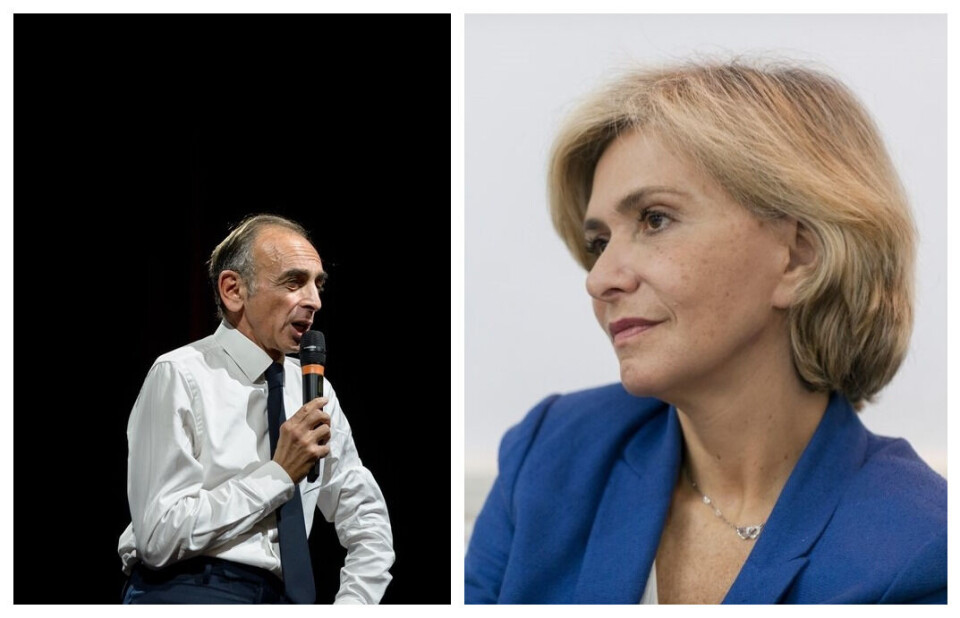-
What do Trump and other world leaders say about Le Pen office ban decision?
From ‘left-wing abuse of the legal system’ to ‘the rule of law’, reactions have been fierce
-
Comment: Le Tour de France does not export the best of French values
Columnist Nabila Ramdani notes that the fabled race is to start in the UK in 2027, bringing with it a questionable legacy
-
Letters: France needs a new strategy to stop spam calls
Connexion reader says the new legislation will not work just as previous rules failed
‘Why the ‘great replacement’ theory does not make sense in France’
The term, which refers to a conspiracy theory that claims white people are being replaced, was recently used by one of France’s presidential candidates, but does not hold up, a French statistician says

Right-wing French presidential candidate Valérie Pécresse has been heavily criticised by political opponents as well as anti-racism associations for using the phrase “great replacement” in a speech last weekend.
The term is linked to far-right conspiracies that claim there is an intentional movement to replace white Europeans with non-white Europeans through mass immigration.
Ms Pécresse, a candidate for Les Républicains, used the phrase to deny that she supports the fringe ideology, but the mere fact she said it has led to her being accused of allowing the term to enter the mainstream political debate.
“Ten years from now, will we still be the seventh most powerful country in the world?” She asked during a speech in Paris on Sunday (February 13) to her supporters.
“Will we still be a sovereign nation or an auxiliary of the US, a trading post of China? Will we be a united nation or a fragmented nation? Faced with these questions, we will not surrender: Neither to the great replacement or the great decline (in social class),” she said.
The theory is supported by Éric Zemmour, a Far Right fellow presidential candidate. However, it has until now been shunned by all other candidates, including the far-right Marine Le Pen.
Ms Pécresse defended her usage of the term on Monday in an interview with RTL.
She said she only said it to show that “I do not resign myself to the theories of Éric Zemmour and the theories of the extreme right, because I know that another way is possible”.
US newspaper the New York Times published an article yesterday (February 15) saying her use of the phrase had meant it had entered mainstream politics in France.
The paper also criticised her speech for being “punctuated with coded attacks on immigrants and Muslims”.
The Connexion published an article in print in October 2021 outlining a French statistician’s viewpoint that the ‘great replacement’ theory (grand remplacement, in French) does not add up.
You can read the full article below, online for the first time, written by Rory Mulholland.
Note, some elements of the original article have been edited to bring them up to date.
Islamic Republic Theory ‘not based on facts’
By Rory Mulholland
Claims by far-right commentator and possible presidential contender Eric Zemmour that France will, if current trends continue, be “submerged” by Muslims and end up an Islamic republic have been refuted by a leading demographer.
Mr Zemmour is a proponent of ‘the great replacement’, a far-right theory that typically claims there is a deliberate policy by French and EU elites to replace the white population of France with darker-skinned immigrants, especially Muslims, through mass migration combined with a trend of lower birth rates among white people.
Read more:Zemmour announces presidential candidacy saying he will ‘save France’
The theme is relentlessly touted by Mr Zemmour in his media outings and most recently on a countrywide tour to promote his new best-selling book, the latest in his series of works lamenting the supposed decline of France.
However, Hervé Le Bras, director emeritus of the National Institute for Demographic Studies (Ined), says the facts do not back up the claims.
“The ‘great replacement’ idea is not ridiculous but it is simply false and neither Zemmour nor [French far-right writer] Renaud Camus, who imported it from the United States, have established it with a projection model [ie. a serious study of demographic trends]. It is a slogan they use to scare people about immigration.”
In September 2021, Mr Zemmour was acquitted on appeal of incitement to hatred after making inflammatory remarks about Islam and immigration at a 2019 political meeting in Paris.
The 63-year-old, whose own family background is North African and Jewish, was convicted of inciting racism in both 2011 and 2018.
He insists he is not racist, but endlessly turns to the themes of race and Islam, which he claims are a threat to French culture and identity and says the state must crack down on immigration.
The latest opinion polls for voter intention for the 2022 presidential election show he has around 15% of voters’ support. He is not yet an official candidate as he must first secure the support of 500 elected officials.
Read more:French election: Trotskyist candidate passes 500 signatures threshold
If he gets enough support and stands, he could damage far-right Rassemblement National leader Marine Le Pen’s chances of beating Emmanuel Macron.
The cover of Zemmour’s new book, La France n’a pas dit son dernier mot (France has not had its last word), appears to be modelled on the cover of the book Donald Trump wrote to outline his agenda as he ran for the US presidency in 2016.

Many commentators see his ideas as dangerous. His new book argues that Muslims are trying to colonise France. He writes about a Paris suburb with a significant Muslim population as a “foreign enclave”.
Mr Zemmour claims that by 2050, half of the French population will be Muslim, and by the end of the century, the country will be an Islamic republic.
This is nonsense, according to Mr Le Bras. His own population projections, as outlined in his 2020 book Serons-nous submergés? (Will we be submerged?) show that all immigrants combined (and their descendants) will make up 19%-32% of the population in 2050, and 22.5%-42% in 2100, the range depending on precise definitions of an ‘immigrant’.
The first, lower, figure, which he considers reasonable, does not include the descendants of mixed unions.
According to Mr Le Bras, Mr Zemmour relies on clichés rather than facts, though he says it is true that immigrant women tend to have more children – on average, one more child – and Mr Le Bras’ figures take this into account, along with the typical annual immigration statistics in recent years of 170,000 arrivals, compared to 120,000 French-born people moving abroad.
Mr Le Bras added: “Barring extraordinary events, according to all the hypotheses, there will be a majority of French people in 2050, especially as currently 40% of immigrants are French and all their children over 15 years old are.
“French means having French nationality – the case for 94% of France’s inhabitants.”
Mr Le Bras says the ‘great replacement’ idea plays on old ideas about the decline of civilisations, such as the Roman Empire due to massive invasion by barbarians, which is not taken seriously by modern historians. What is more, without immigration, France’s population would have been declining since 2017.
Mr Le Bras notes that Mr Zemmour’s claims about the dilution of French identity are nothing new. In 1985, he points out, the front page of Le Figaro Magazine asked: “Will we still be French in 2015?”
Related articles
Which French election candidate does your mayor support? How to check
French political parties: What killed off the Left and can it recover?
French presidential election: Key candidates and their main policies
























